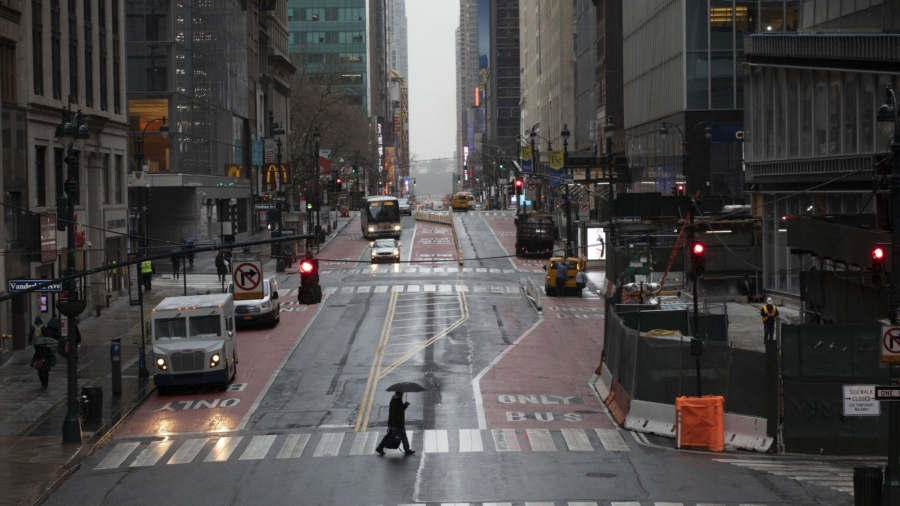PARIS—The hunt for masks, ventilators, and other medical supplies consumed the United States and Europe, as more than 1.5 billion people—one-fifth of the world’s population—were asked or ordered to stay home on Monday to try to blunt the spread of the CCP virus.
Political paralysis stalled efforts for a quick aid package from Congress, and U.S. stocks fell at the opening bell even after the Federal Reserve said it will buy as much government debt as necessary and lend to small and large businesses and local governments to help them cope with the economic damage from the outbreak.
In New York, where a near-lockdown took effect statewide over the weekend amid fears the city could become one of the world’s biggest hot spots, the mayor warned that hospitals are 10 days away from shortages in “really basic supplies” needed to protect health care workers and patients alike.
“If we don’t get the equipment, we’re literally going to lose lives,” Mayor Bill de Blasio told CNN.

The risk to doctors, nurses, and others on the front lines has become plain: Italy has seen at least 18 doctors with the CCP virus die. Spain reported that more than 3,900 health care workers have become infected, accounting for roughly 12 percent of the country’s total cases.
British health workers pleaded for more gear, saying they felt like “cannon fodder.” In France, doctors scrounged masks from construction workers, factory floors, and an architect.
“There’s a wild race to get surgical masks,” François Blanchecott, a biologist on the front lines of testing, told France Inter radio. “We’re asking mayors’ offices, industries, any enterprises that might have a store of masks.”
Health care workers say they are being asked to reuse and ration disposable masks and gloves. A shortage of ventilators, crucial for treating serious COVID-19 cases, has also become critical, as has a lack of test kits to comply with the World Health Organization’s exhortations to test as many people as possible.
In the United States, President Donald Trump told state governors that they should find their own medical equipment if they think they can get it faster than the U.S. government. Alaska is expected to run out of money imminently to pay doctors, hospitals, and clinics who treat Medicaid patients.
Dr. Anthony Fauci, the U.S government’s top infectious-disease expert, promised that medical supplies are about to start pouring in and will be “clearly directed to those hot spots that need it most.”
Meanwhile, efforts for a quick economic relief package from Congress faltered. The U.S. Senate voted against advancing the nearly $2 trillion plan. Democrats argued it was tilted toward corporations rather than workers and health care providers. Another vote was expected Monday.
The delay shook investors, as has the accumulation of canceled events large and small, the soaring numbers of unemployed, and a widespread pullback in spending.
After just a few weeks, the United States has more than 33,000 cases and more than 400 deaths. New York, California, and Illinois have ordered residents to stay home unless they have essential reasons to go out.
For most people, the new virus causes only mild or moderate symptoms, such as fever or coughing. But for some older adults and people with existing health problems, it can cause more severe illness, including pneumonia.

Authorities kept up their push to get people to stay home, but some were clearly not listening.
Photos showed long lines of parked cars as hundreds walked up the remote mountains of Snowdonia National Park in Wales, which saw “its busiest-ever visitor day” on Saturday.
British Health Secretary Matt Hancock described those ignoring the government’s social distancing recommendations as “very selfish” and warned that stricter rules might be coming soon.
“If people go within 2 meters of others who they don’t live with, then they’re helping to spread the virus,” he said. “And the consequences of that costs lives.”
Italy’s infections continued to spike, hitting 59,000 cases and 5,476 deaths, and India took the extraordinary step of shutting down the country’s rail system, which has long been the lifeblood of the country of 1.3 billion people. The arrival of the global pandemic in Syria as well as the Gaza Strip has raised concerns it could run rampant in some of the most vulnerable areas in the Mideast.
Two former passengers of the virus-infected Diamond Princess cruise ship died, bringing to 10 the number of deaths from a ship that had over 700 infections and stands as a prime example of how not to contain an outbreak.
With weddings and other large gatherings banned in many places, an untold number of burials are going forward with nothing more than a minister, a funeral home staffer, and one loved one to bear witness.
Republican Rand Paul of Kentucky became the first U.S. senator to announce he was infected, joining the likes of celebrities like opera superstar Plácido Domingo.
German Chancellor Angela Merkel put herself into quarantine after a doctor who gave her a pneumonia vaccine tested positive. She later tested negative.

Japanese Prime Minister Shinzo Abe acknowledged that postponing this year’s Summer Olympics could be unavoidable. Canada and Australia added to the pressure on Olympic organizers by suggesting they wouldn’t send athletes to Tokyo this summer. The International Olympic Committee said it would examine the situation over the next few weeks.
“If it is difficult to hold in a complete way, a decision of postponement would be unavoidable,” Abe said.
Scientists in London predicted that the pandemic’s death toll could easily top 1 million people in the United States alone.
But Trump suggested that the remedies to fight the pandemic—including worldwide financial pain—may be more harmful than the outbreak itself and vowed to reassess government restrictions after the 15-day mark of the U.S. shutdown.
“WE CANNOT LET THE CURE BE WORSE THAN THE PROBLEM ITSELF,” he tweeted.
By Lori Hinnant

